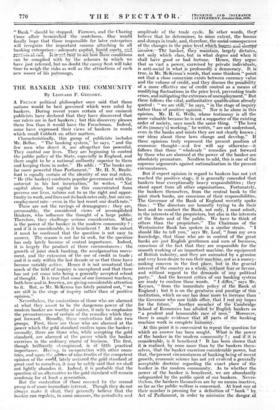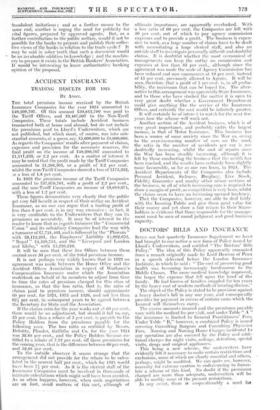THE BANKER AND THE COMMUNITY
By LEONARD F. GREGORY.
A FRENCH political philosopher once said that those nations would be best governed which were ruled by bankers. During recent years certain of our eminent publicists have declared that they have -discovered that our rulers are in fact bankers ; but this discovery pleases them less than it would have the Frenchman. Indeed, some have expressed . their views of bankers in words which recall Cobbett on other matters.
Characteristically, this group of publicists, Mr. Belloc. " The banking system," he says, and the few men who direct it, are altogether too powerful. They control our lives. They. are beginning to control the public policy of the State, especially in England, and there ought to be a national authority superior to them and keeping them in *order.' He adds : "The 'banks are far more powerful than Parliament." Mr. H. N. Broils- ford is equally certain of the identity of our real rulers. " He (the banker) confronts popular government with the autocrat in his last incarnation,', he writes. ".Not. capital alone, but 'capital in this concentrated form governs our lives, rations out to us the right and oppor- tunity to work, and fixes not its bank rates only, but our.un- employment rate—even in the last resort our death rate." These are not the ravings of demagogues :.they are, presumably, the considered views of accomplished thinkers, who influence the thought of a large public. Therefore, they challenge serious consideration. What is the power of the banker in the modern community ? ; . and if it is considerable, is it beneficent ? At the outset, it must be confessed that the question is not easy. to. answer. The reason is not far to seek, for the question has only lately becoine of central importance. Indeed, it is largely the product of three circumstances : the. growth of joint stock banking, the amalgamation move- ment, and the extension of the use of credit in trade ; and it is only within the last decade or so that theselhave Become notably; aetive.• Hence it is not unnatural, that,. Much of the field of inquiry is unexplored and that there has not yet come into being a generally accepted school of thought. It is true that some of our foremost teachers, both here and in America, arc giving considerable attention to it. But, as Mr. McKenna has lately pointed out, " we arc • Still in the stage of inquiry rather than of positiVe opinion.", Nevertheless, the contentions of those who are alarmed at what- -they assert to be the dangerous power of the modern banker are worthy of notice, if only to emphasize the prematureness of certain of the remedies which they put forward.. Broadly, these contentions fall into two groups. First, there are those who are alarmed at the power which-the_gold standard confers upon the banker ;. secondly; there are those who, while accepting the gold standard, are alarmed at the power which the banker exercises -in the ordinary:course of business. The first, though brilliantly ohampinned; is of little practical importance. Having, in co-operation with other coun- tries, and upon the advice of nine-tenths of the competent opinion of the world, lately restored the gold standard at great cost to ourselves, it may be safely said that we shall not lightly abandon it. Indeed, it is probable that the question of an alternative to the-gold standard will remain academic for at least a generation. But the contention of those covered by the second group is of more immediate interest. Though they do not always Make it clear; they generally- believe that the banker can regulate, in some measure, the periodicity and amplitude of the trade cycle. In other words, they believe that. he determines, to some extent, the booms! and slumps in -trade, and, therefore, the social consequences of the changts in the price level which,b9=4,-• The- banker, they maintain, largely dietates,,. not only which class, but in What • degree and when itl shall have good or bad ' fortune. • Hence, they argue! that so vast a power,' exercised by private individuals,] is anti-social in' what is 'professedly a democraey. • -It is true, in Mr. McKeima's words, that some thinkers," point: out that a close connexion exists between currency value and the volume of credit, and they discuss the possibility of a more effective use' of credit control f, : as a means o modifying fluctuations in the price level, preventing trade crises, and mitigating theextremes of unemployment." But there follows the vital, authoritative qualification already quoted : " we are still," he says, " in the stage of inquiry- rather than of positive opinion." Nor is he alone in this opinion. Mr. H. G. Wells, whose testimony is all the more valuable because he is not a supporter of the existing order of society, says much the same thing. " The laws of its (money's) working," he writes, " are not understood, even in the banks and mints they are not clearly known ; our ideas about these laws change and develop." If these opinions truly represent the present position of economic thought—and few will say otherwise—it follows that those " wholesale " remedies put forward by those who are alarmed at the power of the banker. are absolutely premature. Needless to add, this is one of the supreme arguments against nationalization in the present. circumstances.
But if expert opinion in regard to bankers has not yet:, reached the _positive stage, it is generally conceded that bankers bear exceptionally heavy responsibilities ; they stand apart from all other organizations. Fortunately, the bankers themselves, from the central bank to the joint stock banks, are conscious of their responsibilities.- The Governor of the Bank of England recently spoke. thus : " The directors are honestly trying to do their best and to conduct the Bank, not only, I must adinit;- in the interests of the proprietors, but also in the interests of the State and of the public. We have to think of others than the proprietors." The Chairman of the Westminster Bank has spoken in a .similar strain. " I should like to tell you," says Mr. Leaf, froni my own linOWledge, that those who are in control of the great banki are just' EngliSh 'gentlemen and men of business,- conscious of the, fact that they are responsible for the. smooth working of an important machine, the equipment of British industry, and they are animated by a genuine and very keen desire to run their machine, not as a money- making concern in the first place, lint iii . the general interest of the country as a Whole; 'Without fear. or favour, and without regard to the demands of any.. political party." And the keenest critics of our banking system- are ready to confirm these words. ", I- differ, says Mr. KeyneS, from the immediate policy' of the Bank of England ; but it is on the greatness and prestige of this institution, which no one-has done-More toincrease than' the Governor who now hblzh Office,•that I restxi:1i hopes' for the future." Another member of the- 'Cambridge School of Economics hast.-allu-ded to' English bankers as "a prudent and honourable -race _Of - Moreover, there is ample evidence that ail: parts of the banking machine work in complete • At this point it is convenient to repeat the question for which' an answer has been sought. What is the power of the banker ih the "moderncommunity ? ; andlf,"it. is: considerable, is it beneficent ? It has been shown that Wit realized, by none more than by the bankers them- selves, that the banker exercises considerable power, but that, thepresent circumstances of banking being of recent growth, economic science has not yet evolved a generally acceptable doctrine regarding the exact place of the banker in the modern community. As to whether the power of the banker is beneficent, _we -are abundantly safeguarded by the public spirit of our bankers. Never- theless, the bankers themselves are by no means inactive, so far as-the public welfare is concerned. At least one of- their number is pressing for a definition of " bank " by Act of Parliament, in order to .minimize the danger .of_ fraudulent imitations ; and as a further means to the lame end, another is urging the need for publicity for vital figures, prepared by approved agents. But, as a further contribution to the public welfare, would it not be possible for the -banks to prepare and publish their collec- tive views of thehanks'in =relation to the trade cycle ? It may be said in 'sober truth that such a document would • be an invaluableaddition to knowledge; and the machin- ery to prepare it exists in the-British Bankers' Association. It would be • interesting- to know authoritative banking opinion of the proposal. - -































































 Previous page
Previous page